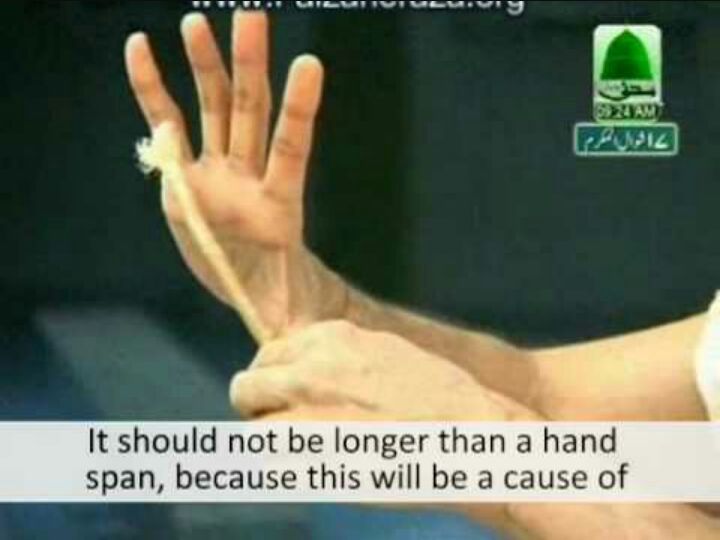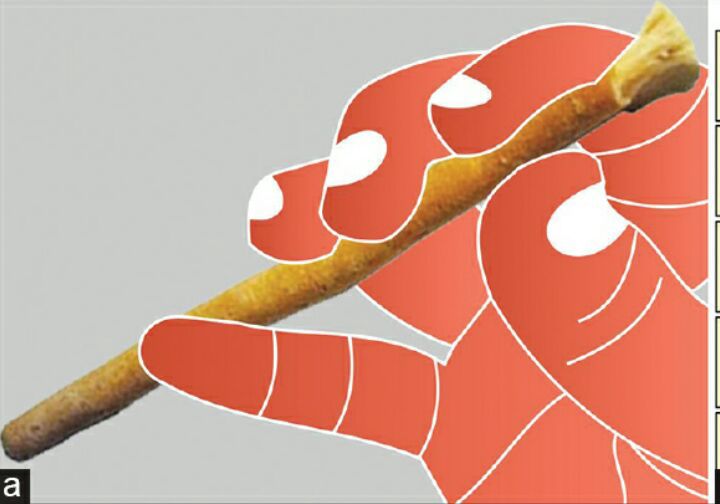Manners of DARE#2
Notes pertaining to Miswak:
•Miswak should be as thick as the little finger.
•Miswak should not be longer than one's hand span (the distance between the tip of the thumb and that of the little finger when the hand is fully extended) as Satan sits on the Miswak longer than this.

•The strands of Miswak should be soft; otherwise, they might cause space between teeth and gums.
•Use a fresh Miswak, if available. Otherwise, place it in a glass of water to make it soft.
•Trim the strands of Miswak every day as they are beneficial so long as they have some bitterness.
•Brush your teeth horizontally with Miswak.
•Always brush your teeth with Miswak at least thrice.
•And wash it after every use.
•Hold the Miswak in the right hand in such a manner that the little finger remains at the bottom, and the middle three fingers remain on it while the thumb remains at the top (near the soft strands that are used to brush the teeth).

•Brush (with Miswak) the upper teeth of the right side first and then the left. Thereafter, clean the lower teeth again starting from the right and then the left.
•To use Miswak while one is lying on his back can cause the spleen to enlarge.
•To use Miswak when held in fist can cause piles.
•Miswak is a pre-Wudu Sunnah.
•However, it becomes Sunnah al-Mu'akkadah when foul smell emanates from the mouth.
[Fatawa Razawiyyah, Vol. 1, Page 223]
•Don't throw away the used bristles or used Miswak. Instead, place it at a safer place e.g. bury under the ground or sink into the sea etc. as it is sacred, being tool for acting upon a Sunnah.
[Bahar-e- Shari'at, Vol. 1, Page 294, Durr-e-Mukhtar wa Radd al-Muhtar, Vol. 1, Page 250]
How to hold the Miswak
According to 'Abd Allah ibn Mas'ud (may Allah be pleased with him) hold the Miswak in the right hand so that the small finger is below the Miswak and the thumb is below the tip and the other fingers are on top of the Miswak. Do not hold it in the fist as there is a chance of illness.
Shaykh Ahmad Raza Khan writes;
"To keep the teeth healthy, a deed has been practised by the scholars, that is in the first cycle of the Witr prayer recites Surah Nasr , in the second Surah Lahab and in the third Surah Ikhlas ."
••••••••••••••••••••••••••••••••••••••••••
I hope the following lesson in the book of Riyad-Us Saaliheen will give you more motivation and inspiration to follow this DARE#2 (Sunnah). The lesson is exactly taken from the book. No any changes made to the original copy.
The Excellence of using Miswak (Tooth-Stick) - Riyad Us Saaliheen
1196. Abu Hurairah (May Allah be pleased with him) reported:
The Messenger of Allah صلى الله عليه وسلم said,
Had I not thought it difficult for my Ummah, I would have commanded them to use the Miswak (tooth-stick) before every Salat.''
[Al-Bukhari and Muslim].
Commentary: We learn from this Hadith that the Prophet صلى الله عليه وسلم liked to clean his teeth with Miswak (a softened stick used as tooth brush for cleaning the teeth) with every Salat, but he did not made it obligatory for the reason that it would be inconvenient for his followers. It shows that he was extremely affectionate and kind to his Ummah.
This Hadith also shows that using Miswak is an admirable act. Every Muslim should make it a routine to use it as frequently as possible especially before performing prayers.
1197. Hudaifah (May Allah be pleased with him) reported:
Whenever the Messenger of Allah صلى الله عليه وسلم got up (from sleep), he would rub his teeth with Miswak (tooth-stick).
[Al-Bukhari and Muslim].
Commentary: When a person awakes from sleep, he has an unpleasant breath because of the smell in his mouth. For this reason, the Prophet صلى الله عليه وسلم would cleanse his teeth with Miswak. We should also follow him and make this Sunnah a routine.
1198. 'Aishah (may Allah be pleased with her) reported:
We used to prepare for the Messenger of Allah صلى الله عليه وسلم a Miswak (tooth-stick) and the water for making Wudu'. Whenever Allah wished to awaken him from sleep at night, he صلى الله عليه وسلم would brush his teeth with Miswak, make Wudu', and perform Salat.
[Muslim].
Commentary: This Hadith shows how particular the Prophet صلى الله عليه وسلم was about using Miswak. Besides pointing out the importance of Miswak, it also throws light on the noble conduct of the wives of the Prophet صلى الله عليه وسلم as it shows how keen they were about his needs, habits and temperament.
1199. Anas (May Allah be pleased with him)reported:
The Messenger of Allah صلى الله عليه وسلم said, I stress upon you to use Miswak (tooth-stick).''
[Al-Bukhari].
1200. Shuraih bin Hani (May Allah be pleased with him) reported:
I asked 'Aishah (may Allah be pleased with her): What was the first thing which the Prophet صلى الله عليه وسلم would do when he entered his house?''
She replied: He would use Miswak (tooth-stick).''
[Muslim].
1201. Abu Musa Al-Ash'ari (May Allah be pleased with him) reported:
I came to the Prophet صلى الله عليه وسلم once and noticed the tip of Miswak (tooth-stick) on his tongue.
[Al-Bukhari and Muslim].
1202. 'Aishah (May Allah be pleased with her) reported:
The Prophet صلى الله عليه وسلم said, The Miswak (tooth-stick) cleanses and purifies the mouth and pleases the Rubb.''
[An-Nasa'i and Ibn Khuzaimah].
Commentary: Mataharah'' means a medium and means of purification. Mitaharah means an instrument/tool for purification. In other words, on the one side, Miswak is a means of cleaning and purifying the mouth, and on the other, a way to attain the Pleasure of Allah.
1203. Abu Hurairah (May Allah be pleased with him) reported: The Prophet صلى الله عليه وسلم said, There are five acts which conform to the pure nature:
Circumcision, removing of the pubic hair, clipping the nails, plucking the underarm hair and trimming the moustache.''
[Al-Bukhari and Muslim].
Commentary: Fitrah literally means beginning, innovation, invention or making something altogether new, but here it means instinct or such nature or disposition which is inborn. Some people have defined it as that old way which was liked by all the Prophets and on which all the Divine laws had full agreement. That is to say, they are natural to man. In any case, one should adopt all these five good qualities in such a way as if they are a part of his nature. Moreover, they are also highly important from the point of view of cleanliness and purification.
1204. 'Aishah (May Allah be pleased with her) reported:
The Messenger of Allah صلى الله عليه وسلم said,
"There are ten demands of pure nature:
trimming the moustache, letting the beard grow, using Miswak (tooth-stick), snuffing up water into the nose (in ablution), paring the nails, washing the bases of the finger joints; plucking the underarm hair, removing of the pubic hair and removing impurities with water from the affected part after a call of nature.''
The subnarrator said: I forgot the tenth but it might possibly be the rinsing of the mouth (in ablution).
[Muslim].
Commentary: This Hadith tells us about ten qualities which are natural to human beings. Some 'Ulama' are of the opinion that the tenth quality among them is circumcision. Anyway, the importance of these ten qualities and the stress on them are evident. The first thing among them is the trimming of moustache. This is Sunnah of the Prophet صلى الله عليه وسلم and is meant to cut the projected hair on the upper lip.
2. In the opinion of 'Ulama', keeping the beard is compulsory but its extent is not determined. On the basis of Ibn 'Umar's practice, some 'Ulama' hold that the size of handful is essential and beyond that cutting is permissible, or according to a weak narration some consider its trimming towards length and breadth quite fair. But this opinion is not correct.
In the words of Al-Bukhari and Muslim, the Prophet صلى الله عليه وسلم used five words for it which are (a'fu, aufu, arkhu, arju, waq'iru) and all of them have similar meanings that the beard should be left alone on natural growth. But, for a few exceptional cases, the common injunction in this behalf is that one should keep full beard. One should neither trim it in length and breadth nor make it handful in size. One can, however, bring it to a normal size in case of its wild growth if one fears that it will cause derision and laughter.
3,4. The Miswak and the rinsing of mouth, and putting water into the nostrils are necessary for Wudu'. "Istinshaq'' means to draw water with full force in the nostrils as one does for smelling perfume. Except during Saum, Istinshaq is stressed in Wudu'.
5. Paring of the nails is also necessary for cleanliness. If this is not done, filthy matter will go to the mouth through the nails. The fashion of keeping long nails, similar to beasts and animals, now in vogue in women as well as men is not only against nature but is also a sign of beastliness and ferocity.
6. The washing of the joints of fingers is also necessary for cleanliness.
7,8. The removal of the underarm hair and below the naval is an integral part of cleanliness and inordinate delay in it is disliked. According to a Hadith, delay in it beyond forty days is disgusting.
9. Cleaning with water after evacuation is a must for purification because one cannot perform Salat without it. It is permissible to use clod or toilet tissue, etc., but such things used for this purpose should be odd in number, i.e., 3,5,7. But it is better to follow this with water, as water is a natural cleanser.
10. Circumcision is also an old tradition or practice. According to the general opinion of 'Ulama', it is obligatory. Some of them are of the view that it is desirable on the seventh day. It is, however, permissible afterwards.
1205. Ibn 'Umar (May Allah be pleased with them) reported: The Prophet صلى الله عليه وسلم said,
"Trim the moustaches and let the beard grow.''
[Al-Bukhari and Muslim].
Commentary: Ahfu means trim excessively. Thus, keeping of long moustaches will be against this injunction. The meanings of the word A'fu have been stated above, that is, leave the beard to follow its natural growth.
•••••••••••••••••
Hope you found this chapter beneficial.
In Shaa Allah lets move to DARE#3 very soon. Until then keep on following the DARES (sunnahs you have learnt so far)
Hope my lovely sisters are implementing what they learn!
Jazakum Allahu Khairan.
"سُبْحَانَكَ اللْهُمَّ وَبِحَمْدِكَ، أَشْهَدُ أَنْ لَا إِلهَ إِلَّا أَنْتَ، أَسْتَغْفِرُكَ وَأَتُوبُ إِلَيْكَ"
'Glory be to You O Allah, and with Your praise, I testify that there is no God (worthy of worship) except You, I seek Your forgiveness, and I repent to You.'
Bạn đang đọc truyện trên: AzTruyen.Top